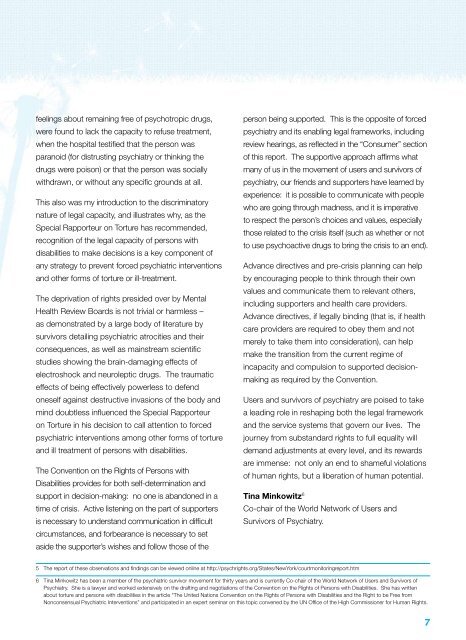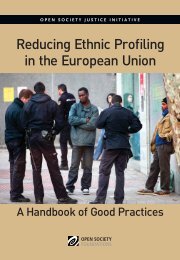Lacking Insight - Community Law
Lacking Insight - Community Law
Lacking Insight - Community Law
- No tags were found...
You also want an ePaper? Increase the reach of your titles
YUMPU automatically turns print PDFs into web optimized ePapers that Google loves.
feelings about remaining free of psychotropic drugs,were found to lack the capacity to refuse treatment,when the hospital testified that the person wasparanoid (for distrusting psychiatry or thinking thedrugs were poison) or that the person was sociallywithdrawn, or without any specific grounds at all.This also was my introduction to the discriminatorynature of legal capacity, and illustrates why, as theSpecial Rapporteur on Torture has recommended,recognition of the legal capacity of persons withdisabilities to make decisions is a key component ofany strategy to prevent forced psychiatric interventionsand other forms of torture or ill-treatment.The deprivation of rights presided over by MentalHealth Review Boards is not trivial or harmless –as demonstrated by a large body of literature bysurvivors detailing psychiatric atrocities and theirconsequences, as well as mainstream scientificstudies showing the brain-damaging effects ofelectroshock and neuroleptic drugs. The traumaticeffects of being effectively powerless to defendoneself against destructive invasions of the body andmind doubtless influenced the Special Rapporteuron Torture in his decision to call attention to forcedpsychiatric interventions among other forms of tortureand ill treatment of persons with disabilities.The Convention on the Rights of Persons withDisabilities provides for both self-determination andsupport in decision-making: no one is abandoned in atime of crisis. Active listening on the part of supportersis necessary to understand communication in difficultcircumstances, and forbearance is necessary to setaside the supporter’s wishes and follow those of theperson being supported. This is the opposite of forcedpsychiatry and its enabling legal frameworks, includingreview hearings, as reflected in the “Consumer” sectionof this report. The supportive approach affirms whatmany of us in the movement of users and survivors ofpsychiatry, our friends and supporters have learned byexperience: it is possible to communicate with peoplewho are going through madness, and it is imperativeto respect the person’s choices and values, especiallythose related to the crisis itself (such as whether or notto use psychoactive drugs to bring the crisis to an end).Advance directives and pre-crisis planning can helpby encouraging people to think through their ownvalues and communicate them to relevant others,including supporters and health care providers.Advance directives, if legally binding (that is, if healthcare providers are required to obey them and notmerely to take them into consideration), can helpmake the transition from the current regime ofincapacity and compulsion to supported decisionmakingas required by the Convention.Users and survivors of psychiatry are poised to takea leading role in reshaping both the legal frameworkand the service systems that govern our lives. Thejourney from substandard rights to full equality willdemand adjustments at every level, and its rewardsare immense: not only an end to shameful violationsof human rights, but a liberation of human potential.Tina Minkowitz 6Co-chair of the World Network of Users andSurvivors of Psychiatry.5 The report of these observations and findings can be viewed online at http://psychrights.org/States/NewYork/courtmonitoringreport.htm6 Tina Minkowitz has been a member of the psychiatric survivor movement for thirty years and is currently Co-chair of the World Network of Users and Survivors ofPsychiatry. She is a lawyer and worked extensively on the drafting and negotiations of the Convention on the Rights of Persons with Disabilities. She has writtenabout torture and persons with disabilities in the article “The United Nations Convention on the Rights of Persons with Disabilities and the Right to be Free fromNonconsensual Psychiatric Interventions” and participated in an expert seminar on this topic convened by the UN Office of the High Commissioner for Human Rights.7
















